The Beast Below and Victory of the Daleks
You know, I was thinking, it is amazing that so many people seem to be so gaga over this dorky, little cheesy British sci-fi show. I mean, granted, it's utterly brilliant...
This show about wacky, weird alien that comes down to berate us and doesn't really fit in with us.
...and we utterly adore him.
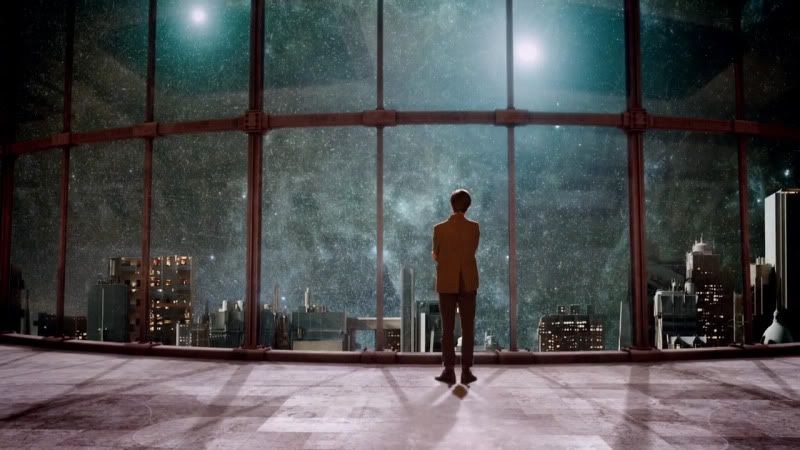
Anyway, my humble review of The Beast Below and Victory of the Daleks:
Subtitled: The Further Adventures of the Teaching Doctor and The Implications of That Role on His Behavior, Character, Personality, Relationships, and Utimate Hero Journey.
Right of the bat, I have to say that the plots of both these episodes were painfully, disappointingly weak. Not only did they make little actual sense, but they were painfully derivative. The Beast Below has not only elements of other Who and Torchwood episodes, but it references Star Wars (garbage pit and inside a giant monster), Lost (as someone already said, all that talking monitor needed was a Dharma logo), Hitchhiker's Guide (those PJs), and a zillion scifi plots with a corrupt, evil government. As for the Daleks, yeah, we've seen them before. About a million times before. Somehow, no matter what, some Daleks survive and the Doctor battles the boring little evil tanks. Snore.
That is not to say that I didn't utterly love Beast Below and enjoy Victory.
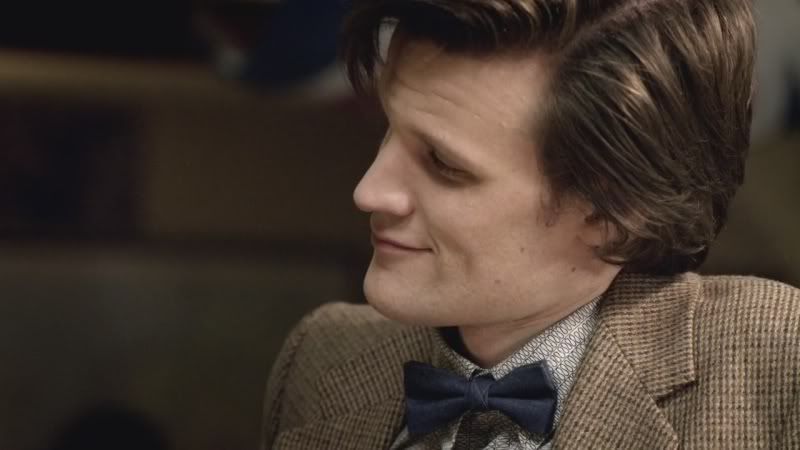
And that is because the plots were really just vehicles for character development and drama, both of which, at this stage, are vitally important.
The thesis statement of my previous review was that the 11th Doctor is a teacher. How very right was I!
It is obvious that 11 was born out of the self-sacrificing death of 10. 10 died for one, solitary, old every man. 10, who's greatest asset was his "children of time", and who's greatest tragedy was that he was never quite one of them. 11 was totally born out of that. All of his teacherliness comes from being both distanced from humans (in a way that 10 never was) and protective of them. 11 doesn't seem to want pals, doesn't seem to mind being alone, and doesn't want to be understood. But, of course, he will instantly jump into action if "there's children crying".
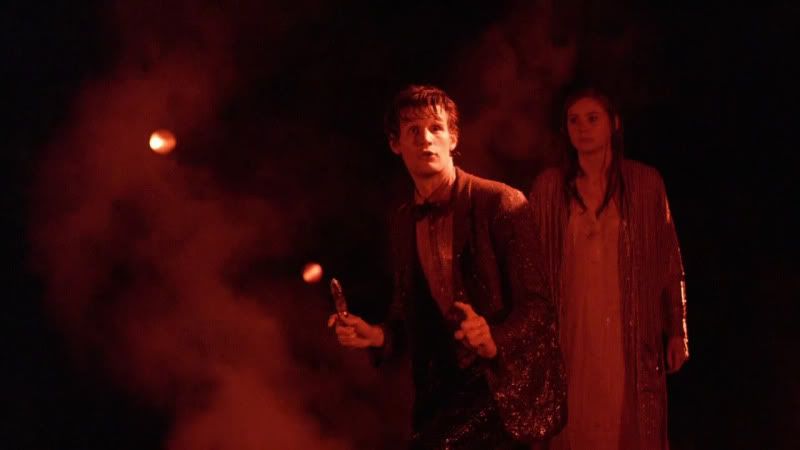
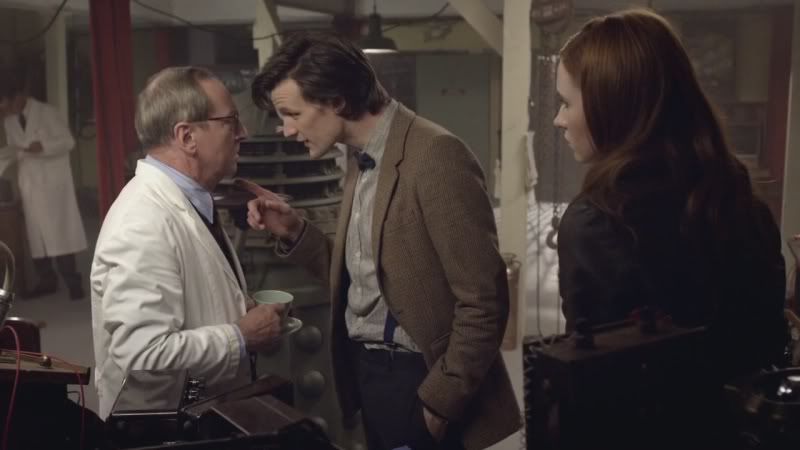
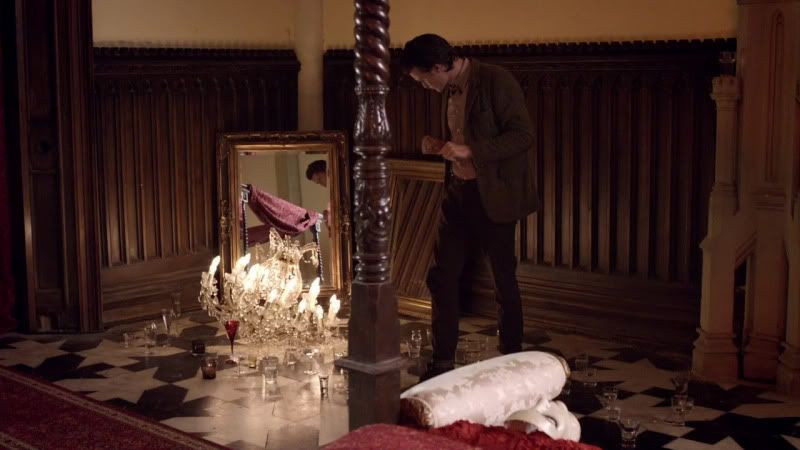
Matt Smith's brilliant mannerisms and powerful performances are an utter joy to watch. He wrings his hands and fiddles with things. 11 bends his tall frame in order to speak to people, which has a lovely symbolic feel to it; our lofty Doctor coming down to our level. He tottles and buttles around the scene. He speaks with wide-eyed glee and fascinated interest in everything, as if it is all a great science discovery. David Tennant was fantastic at this, as well, but 10 had turned very jaded and disillusioned in the end. Ironically, 11 seems a little slow on the uptake because his brain is doing about a thousand things at once ("Don't know, think a lot, it's hard to keep track."). Whereas 10 would say "whoops", 11 would say "look at that!" Whereas 10 was childish, 11 is childlike in his emotions. Yet, 11 is an old man in his delight at everything even though he's seen it all a hundred times before. Oh yes, I believe that Wilfred Mott imprinted on 11's birth. Smith might be 27, but his eyes look 906 years old.

"The world doesn't need me." And yet, 11 is ironically less lofty, less arrogant. Even as he is distant from us, he does not lord it over the humans. He gets up close to talk to them. He questions and pushes them. Even his demeanor when talking to Churchill is like a teacher or a parent, laughing at his cute antics, chiding him, prompting him to action, rather than really taking any himself (except, of course, in the case of Daleks). Perhaps because he is no longer lonely, he doesn't see himself as being more important than other people. In fact, any time that 11 attempts to be arrogant, or even cool, it flops like your dad using popular slang.
But, perhaps the most important thing that we see about 11 in these two episodes is his anger. Like a parent that has stumbled on a child's mess, like a teacher lecturing a misbehaving class, like a disappointed mentor, he expresses his anger easily, almost to a disturbing degree. It is not something you really enjoy watching. Sometimes cool and hard, sometimes explosive and even violent. Though a cool, easy-going, dorky guy, there is a definite no-nonsense, cold anger streak in him.
Amy seems to be the first unwilling companion. The Doctor, as all great teachers do, questions her, pushes her to discovery, pushes her into action. Her personality is very original, too: vulnerable and scared, but also capable and tough, and a bit unhinged. There is something cheeky, and even a little distant in her eyes.
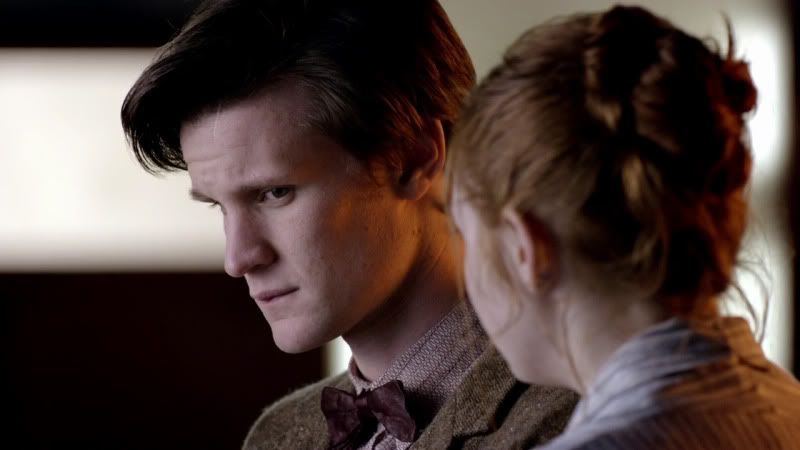
"You don't ever get to decide what I need to know... I know, you're only human."
The most important part of The Beast Below is its ending. First, the Doctor is pissed at Amy for trying to protect him. In his role as teacher or mentor, he is the authority figure, he is the one that does the protecting. He literally scolds her and punishes her for what she has done.
Deciding between humans and an innocent alien is not only a totally new situation for the Doctor (or, at least, one I've never seen him in before), one of his most complicated and complex moral situations, but it is deeply disturbing. And I like deeply disturbing. First, we realize that the "beast below" is the beast within the human race in its capacity to subjugate its population in fear, and not only fear for the self, but fear of the destruction of each other. It is probably fitting that the Doctor is also subject to this fear, as he allows himself to be manipulated into destroying one innocent for the good of many. Right off the bat, we are seeing the weakness of 11's character. His self-sacrificing altruism, his willingness to "not be the Doctor anymore" so that the humans may live, is detrimental and limiting to his actions.
More importantly, the Doctor, for the first time, is forced to chose between humanity and a benevolent alien. We've seen him sacrifice countless humans for the sake of evil aliens (to give them a second chance), but we've never seen this. We've never seen it from our, guilty side. The usually Kantian Doctor decides to sacrifice the last starwhale for the sake of humans. He's horrified by humans, and by himself, but he's very willing to destroy an innocent, good, last-of-its-kind alien, for one ship of human beings. That is screwed up. 11, being born of 10's self-sacrifice, being so paternal and teacherly, has no other option.
"What if you were really old, and really kind and alone, your whole race dead, no future, what couldn't you do then? If you were that old, and that kind, and the very last of your kind, you couldn't just stand there and watch children cry...all that pain and misery, and loneliness, and it just made it kind."
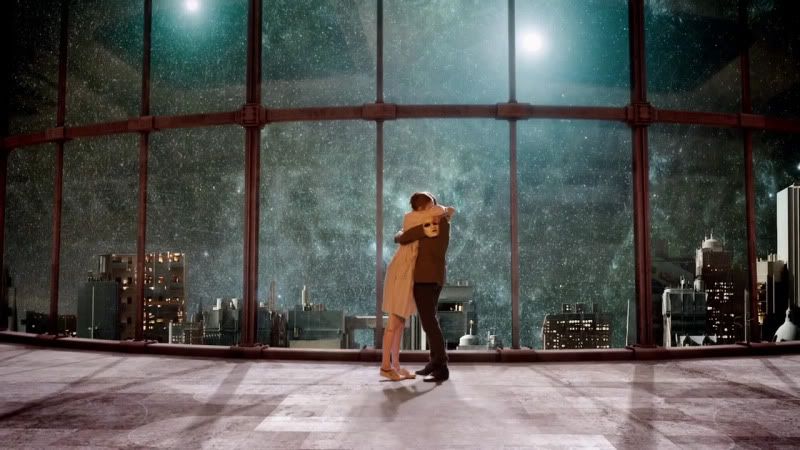
Luckily, he has a student, one of the greatest assets of any teacher. Amy is capable of being what the Doctor isn't, a human. She, as one of them, can make the sacrifice of the humans for the starwhale. This is not a decision that a benevolent, authoritative, selfless person, such as the Doctor or Liz, could make. Only Amy, with her "lowly" status, as well as her understanding of the Doctor (which allows for understanding of the starwhale), is able to take the risk. Amy, as one of the Doctor's crying kids, is able to reveal his character, which I have been highlighting all along. The Doctor is very old, very alone, very businesslike, very benevolent, and has a deep affection for children. "You never interfere with the affairs of other peoples or planets, unless there's children crying."
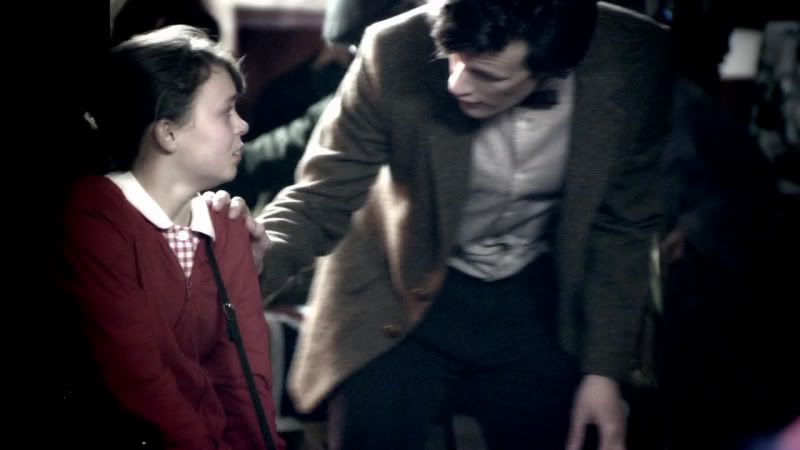
Victory was a slightly refreshing twist on the Daleks, and it followed the series' new twist of showing inside the heads of characters and a more psychological storyline (that the Daleks needed to have their identity confirmed by their enemy). That is a nice new direction for the series.
Again, the Doctor is forced to chose between saving or destroying. It is a difficult decision, but not one that he agonizes over. And I'm beginning to enjoy seeing his angry side. The Doctor, like many teachers, definitely has a child-side to him, with a child's anger and temper right there with the child's play and wonder.
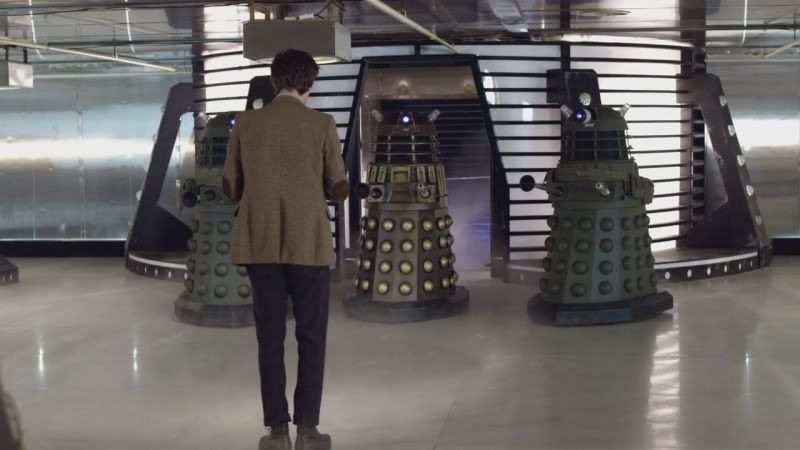

Matt Smith vs. the Daleks First Edition could have been much better; he could have been given a lot more. Doctor Who, has the only hero to attempt to save the world with a cookie. Seriously, I love this show. 11/Smith, interrogating Daleks, like a professor lecturing, was great to watch. His mannerisms (his stance, hands clasped, head down, back curved, hands going, rocking on his heels, smirking) make him seem like an old man teaching a group of mischievous students. The camera even sets him up, one against the many, the teacher in front of the classroom. But it was his eyes and expressions that just showed that he was so very old and sad and angry, all at once.
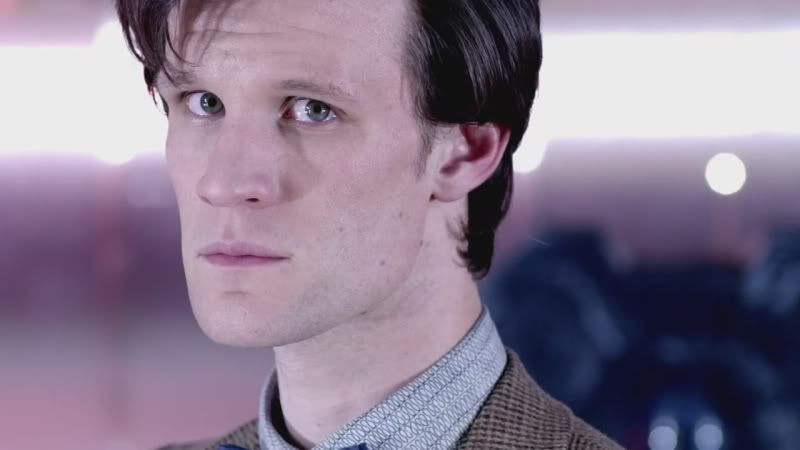
Yes, again, Amy has to save the day by doing the human thing that the Doctor can't do. She hits the right emotion to pull out of the Dalek's robot scientist. The bittersweet emotions that are that a good kind of hurt. And yet, the Doctor still demands the TARDIS key back from her. Even that kiss on the forehead shows that she is still the little girl he almost took with him on a trip to the stars.
Also, there is an odd note in these last two episodes, and that is a slight tone of a mystery. There are quite a few unanswered questions in these three episodes. Why is the Doctor constantly late? Why does Amy lie and say that it was 6 months? That seems weird. The relationship between Amy and her childhood friend, her Doctor that everyone thought "was just a story", is so shrouded in mystery. The Doctor obviously seems to be lying when he says that the only reason he takes her onboard is because he's lonely. Amy's mental stability is a bit in doubt and we seem so in doubt about what is reality and what is story or dream in these first episodes. And, really, isn't it a little dangerous for the Doctor to constantly be saying that children should never grow up?